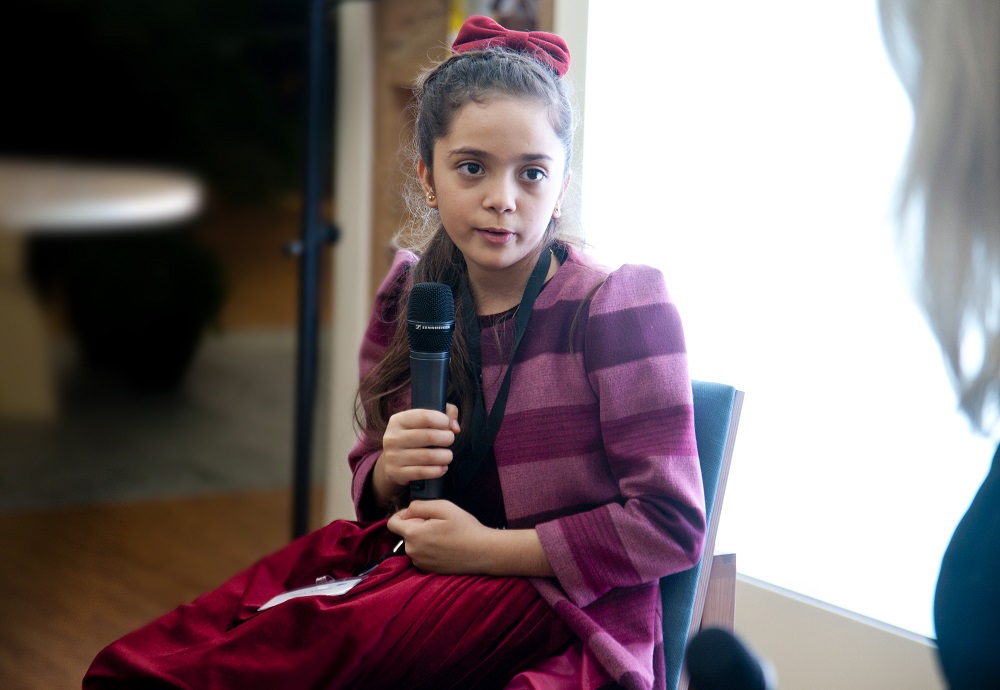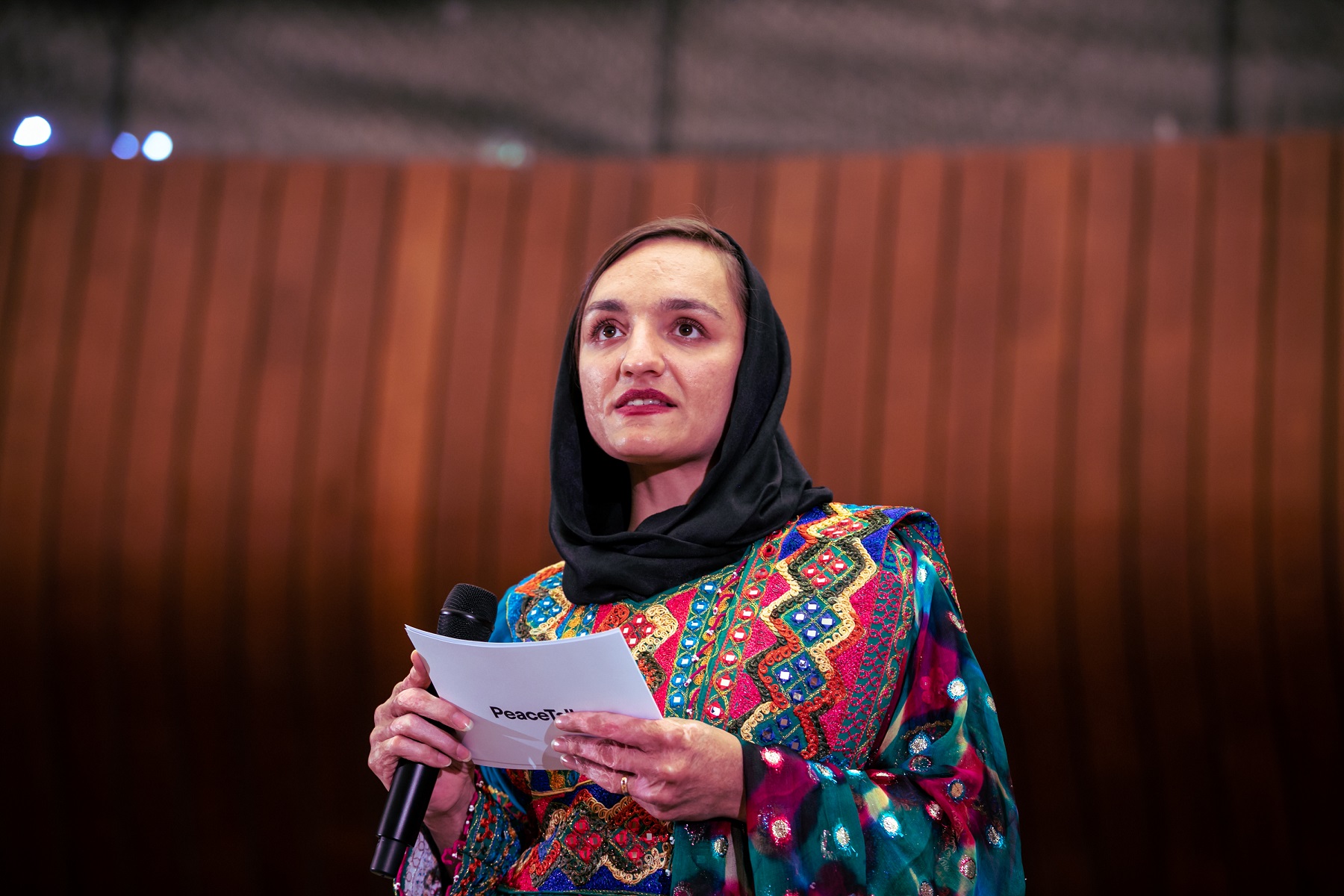This blog post was written by PeaceTalk curator, Sarah Noble and was originally published on Salesforce’s blog.
If you read today’s headlines, you might feel overwhelmed with everything that is going on in the world. I know I do. From the existential threat of human extinction to wars ravaging around the world, deadly forest fires and flooding, the ongoing threat to women’s rights globally — the list goes on and on. It often feels like there is little hope for our future and that there’s barely anything we can do to solve any of these big issues. Yet, there is a great need for us to believe in our power to transform the world for the better and we need to make peace with ourselves, each other and with nature.
Beyond the news headlines, there are great stories of people who are making a positive difference for peace. This is why the PeaceTalks platform was created 10 years ago with the first ever Geneva PeaceTalks being held in 2013 at the United Nations. When we talk about peace, many people think it’s only the job of politicians or high level United Nations officials and they don’t think or know how they can make a difference. But each and every one of us, regardless of our age and background, can contribute to promoting peace in our communities and beyond.
Gail Gallie, co-founder of Project Everyone, works towards making the Global Goals or Sustainable Development Goals famous around the world. Through multiple examples of how individual initiatives can have impact, Gail reminds us that everyone of us can contribute to achieving these goals. “My company’s name is “Project Everyone,” because the goals are a project for everyone. We cannot all be peace negotiators, we cannot all cause wars to cease and there are some terrible things going on in the world at the moment — I think it’s sometimes overwhelming and it spurs you to inaction. But everybody can do something, that’s my message, even if you are not a supermodel or the best teacher in the world, we can all find ways to promote peace.”
Today, PeaceTalks is a global platform dedicated to telling and sharing real-life stories of people positively contributing to peace. These stories and narratives about the major social issues of our time can have an incredible impact on our beliefs around change and our motivation to make it happen. Since 2018, Salesforce is supporting the initiative and offers their offices as a stage for our events.
The core objectives of the PeaceTalks are to:
- Demonstrate that peaceful solutions to conflict exist all over the world.
- Showcase and amplify inspiring stories and what is working to build peace.
- Inspire action and educate on the role that all of us play in promoting peace.
In the last decade, we have welcomed speakers from more than 50 countries around the world to talk about their personal stories and experiences at more than 18 events in seven countries.
One of them was 9-year-old peace activist and author, Bana Alabed, talking about being a child who experienced war in Aleppo, Syria. Bana reminds us that there is no age limit to start promoting peace — all it takes is action, using the tools we have at our disposal. “I asked my mom ‘Mom, why does nobody hear us? Why does nobody save the children? Why does nobody hear the voices when all the children are yelling and crying and running from bombs?’ And my mom told me ‘You can tweet’. I started tweeting my first tweet and was so scared that nobody would hear me. I said to my mom ‘I think it didn’t work’ and she told me ‘Just wait.’ I waited and when I opened my phone the next day, many people had started to hear me.”
Zarifa Ghafari is an Afghan activist, politician and entrepreneur. Known for her efforts to advance women’s rights in Afghanistan, Zarifa experienced an untenable career in politics. In July 2018, at the of 26, Zarifa became one of the youngest mayors and as such emerged as a role model to women in Afghanistan. She fled the country after the Taliban took power in August 2021. “The Taliban attacked me three times. They killed my dad, they destroyed my yesterday and my future, some amount of that. And they took all the hopes and everything that I had and the world that I made for myself.” Despite this, she continues to fight for the important role of Afghan women in the future of the country.
Hiba Qasas, Head of Secretariat of the Principles for Peace Initiative at Interpeace and Yves Daccord, former Director of the International Committee of the Red Cross talked about the need to reshape and rethink peace processes. “We need to believe that peace is possible. It seems to me that, if we look at our community, our society, our media…peace seems to be a rare commodity. Something that is not important anymore. It’s almost something that will not happen. We need to reverse that. Peace is possible.” said Yves Daccord. Hiba Qasas continued with:“We believe that peace is more than political peace. We believe that peace is more than the absence of violence and we believe it’s rooted both in social foundations and national responsibility.”
These examples show us that there is a reason for hope and that it is possible for us to make a difference, regardless of our background.
Hope is what peace means to me — to believe that a better future is possible. Hope is one of the most powerful human emotions. Not only can it help us overcome a difficult situation, but it also can eventually improve our lives because envisioning a better future motivates us to take the necessary steps to make it happen. Hope isn’t inaction. It’s a driving force leading us to a better future.
So let’s dare to believe in peace! On Wednesday, September 21 at 4pm CEST, eight speakers will be at the UN in Geneva to share their personal stories of peace. Building on their different life journeys in the domains of culture, policing, media and peacebuilding, each speaker will share their vision and definition of peace. Join us for the 10th edition of the Geneva #PeaceTalks to celebrate the International Day of Peace on Sep 21, broadcasted live!

